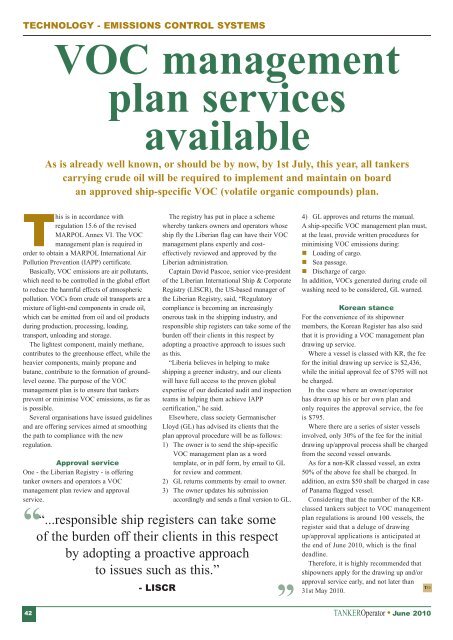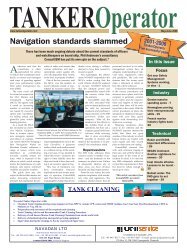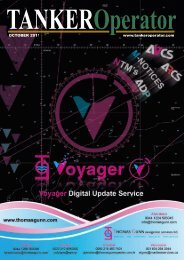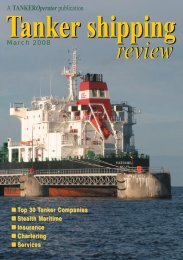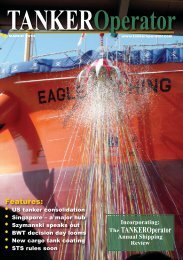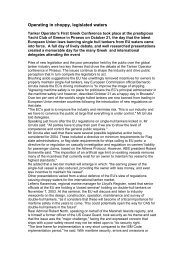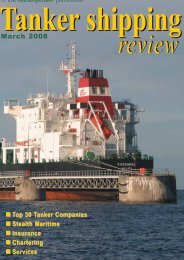Features: - Tanker Operator
Features: - Tanker Operator
Features: - Tanker Operator
Create successful ePaper yourself
Turn your PDF publications into a flip-book with our unique Google optimized e-Paper software.
TECHNOLOGY - EMISSIONS CONTROL SYSTEMS<br />
VOC management<br />
plan services<br />
available<br />
As is already well known, or should be by now, by 1st July, this year, all tankers<br />
carrying crude oil will be required to implement and maintain on board<br />
an approved ship-specific VOC (volatile organic compounds) plan.<br />
This is in accordance with<br />
regulation 15.6 of the revised<br />
MARPOL Annex VI. The VOC<br />
management plan is required in<br />
order to obtain a MARPOL International Air<br />
Pollution Prevention (IAPP) certificate.<br />
Basically, VOC emissions are air pollutants,<br />
which need to be controlled in the global effort<br />
to reduce the harmful effects of atmospheric<br />
pollution. VOCs from crude oil transports are a<br />
mixture of light-end components in crude oil,<br />
which can be emitted from oil and oil products<br />
during production, processing, loading,<br />
transport, unloading and storage.<br />
The lightest component, mainly methane,<br />
contributes to the greenhouse effect, while the<br />
heavier components, mainly propane and<br />
butane, contribute to the formation of groundlevel<br />
ozone. The purpose of the VOC<br />
management plan is to ensure that tankers<br />
prevent or minimise VOC emissions, as far as<br />
is possible.<br />
Several organisations have issued guidelines<br />
and are offering services aimed at smoothing<br />
the path to compliance with the new<br />
regulation.<br />
Approval service<br />
One - the Liberian Registry - is offering<br />
tanker owners and operators a VOC<br />
management plan review and approval<br />
service.<br />
“<br />
42<br />
The registry has put in place a scheme<br />
whereby tankers owners and operators whose<br />
ship fly the Liberian flag can have their VOC<br />
management plans expertly and costeffectively<br />
reviewed and approved by the<br />
Liberian administration.<br />
Captain David Pascoe, senior vice-president<br />
of the Liberian International Ship & Corporate<br />
Registry (LISCR), the US-based manager of<br />
the Liberian Registry, said, “Regulatory<br />
compliance is becoming an increasingly<br />
onerous task in the shipping industry, and<br />
responsible ship registers can take some of the<br />
burden off their clients in this respect by<br />
adopting a proactive approach to issues such<br />
as this.<br />
“Liberia believes in helping to make<br />
shipping a greener industry, and our clients<br />
will have full access to the proven global<br />
expertise of our dedicated audit and inspection<br />
teams in helping them achieve IAPP<br />
certification,” he said.<br />
Elsewhere, class society Germanischer<br />
Lloyd (GL) has advised its clients that the<br />
plan approval procedure will be as follows:<br />
1) The owner is to send the ship-specific<br />
VOC management plan as a word<br />
template, or in pdf form, by email to GL<br />
for review and comment.<br />
2) GL returns comments by email to owner.<br />
3) The owner updates his submission<br />
accordingly and sends a final version to GL.<br />
“...responsible ship registers can take some<br />
of the burden off their clients in this respect<br />
by adopting a proactive approach<br />
to issues such as this.”<br />
- LISCR<br />
”<br />
4) GL approves and returns the manual.<br />
A ship-specific VOC management plan must,<br />
at the least, provide written procedures for<br />
minimising VOC emissions during:<br />
Loading of cargo.<br />
Sea passage.<br />
Discharge of cargo.<br />
In addition, VOCs generated during crude oil<br />
washing need to be considered, GL warned.<br />
Korean stance<br />
For the convenience of its shipowner<br />
members, the Korean Register has also said<br />
that it is providing a VOC management plan<br />
drawing up service.<br />
Where a vessel is classed with KR, the fee<br />
for the initial drawing up service is $2,436,<br />
while the initial approval fee of $795 will not<br />
be charged.<br />
In the case where an owner/operator<br />
has drawn up his or her own plan and<br />
only requires the approval service, the fee<br />
is $795.<br />
Where there are a series of sister vessels<br />
involved, only 30% of the fee for the initial<br />
drawing up/approval process shall be charged<br />
from the second vessel onwards.<br />
As for a non-KR classed vessel, an extra<br />
50% of the above fee shall be charged. In<br />
addition, an extra $50 shall be charged in case<br />
of Panama flagged vessel.<br />
Considering that the number of the KRclassed<br />
tankers subject to VOC management<br />
plan regulations is around 100 vessels, the<br />
register said that a deluge of drawing<br />
up/approval applications is anticipated at<br />
the end of June 2010, which is the final<br />
deadline.<br />
Therefore, it is highly recommended that<br />
shipowners apply for the drawing up and/or<br />
approval service early, and not later than<br />
TO<br />
31st May 2010.<br />
TANKER<strong>Operator</strong> June 2010


